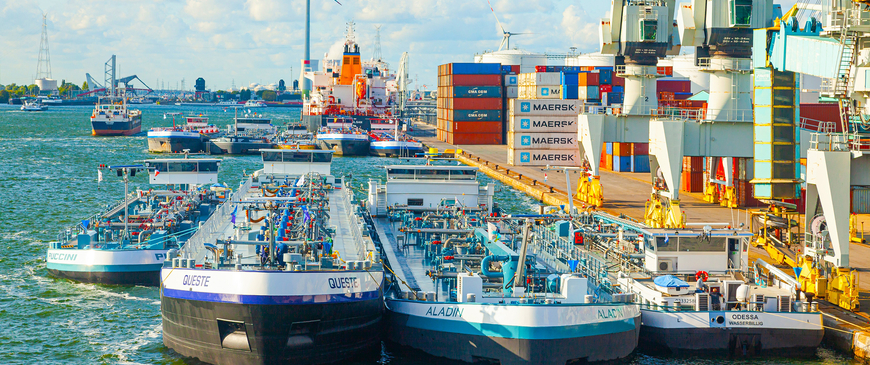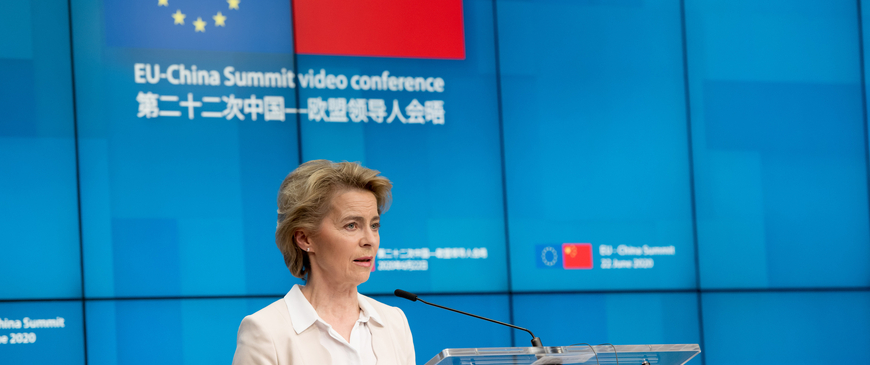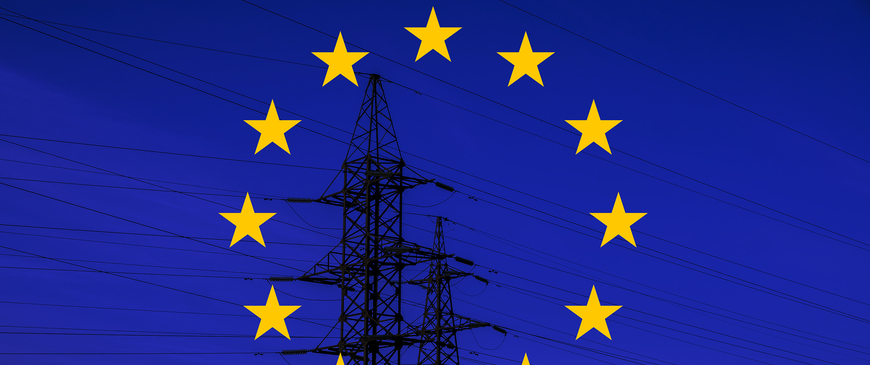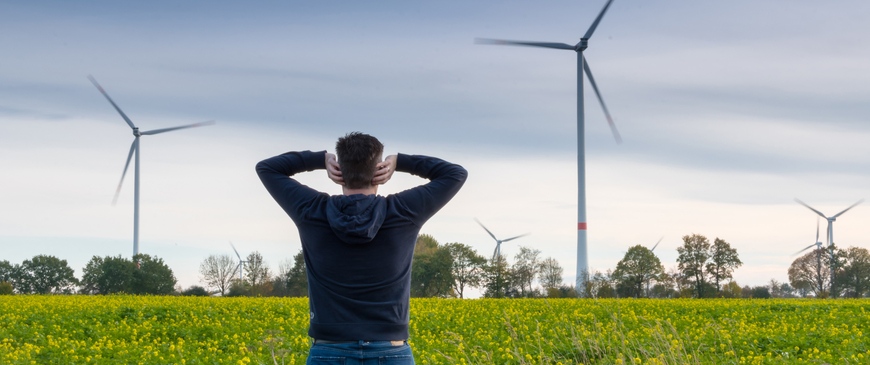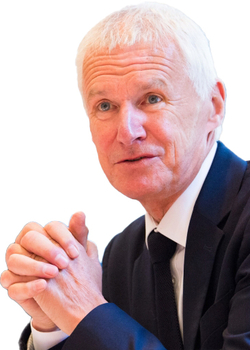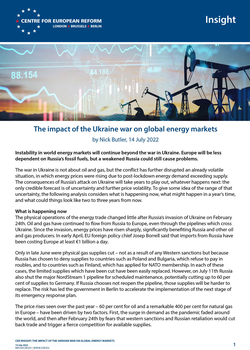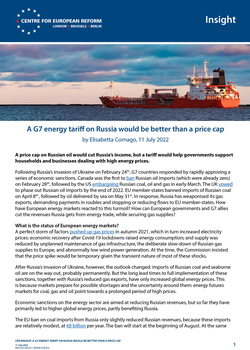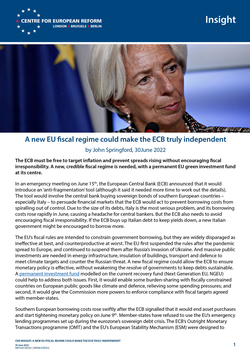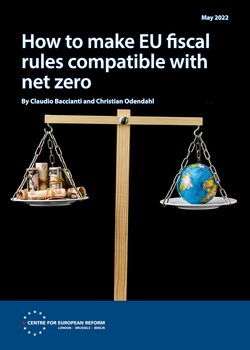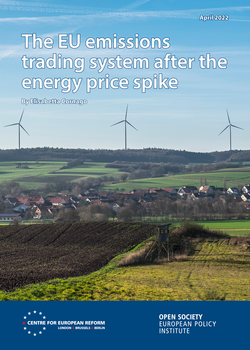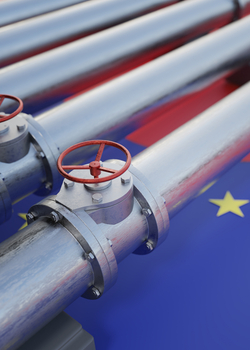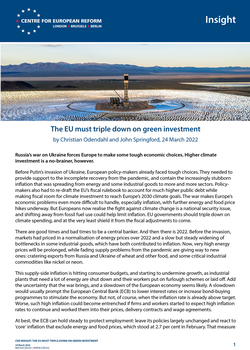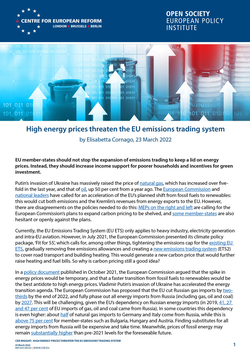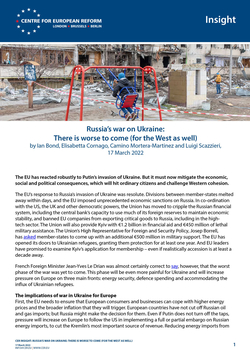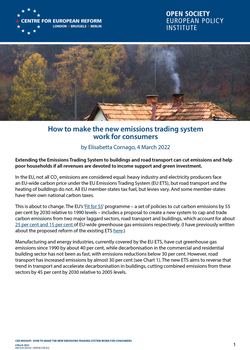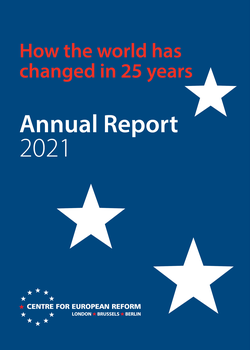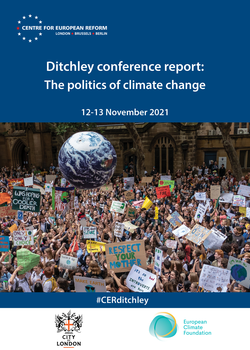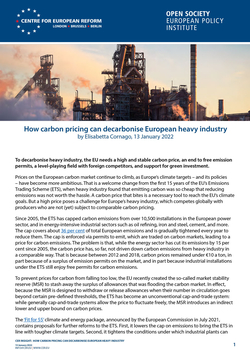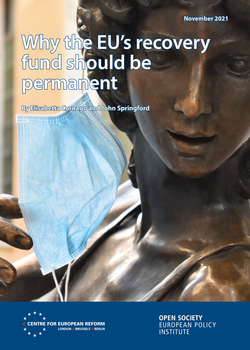Energy & climate
The impact of the Ukraine war on global energy markets
14 July 2022
Instability in world energy markets will continue beyond the war in Ukraine. Europe will be less dependent on Russia’s fossil fuels, but a weakened Russia could still cause problems.
A G7 energy tariff on Russia would be better than a price cap
11 July 2022
A price cap on Russian oil would cut Russia’s income, but a tariff would help governments support households and businesses dealing with high energy prices.
A new EU fiscal regime could make the ECB truly independent
30 June 2022
The ECB must be free to target inflation and prevent spreads rising without encouraging fiscal irresponsibility. A new, credible fiscal regime is needed, with a permanent EU green investment fund at its centre.
How to make EU fiscal rules compatible with net zero
09 May 2022
EU governments will have to invest a lot more to meet 2030 emissions targets. Fiscal rules exemptions and more EU funding are needed to ensure Europe reaches its climate goals without political crises.
The EU emissions trading system after the energy price spike
04 April 2022
EU emissions trading needs an upgrade: the EU should tighten the cap on emissions more rapidly, expand to road transport and buildings, and spend higher revenues on subsidising green investment.
Bulletin issue 143 - April/May 2022
30 March 2022
- Can the West stay united on Ukraine – and what will China do?, Charles Grant
- Europe must stop paying for Russia's war, Ian Bond, Zach Meyers, Elisabetta Cornago
- Russia's assault on Ukraine and European security, Luigi Scazzieri
Europe must stop paying for Russia's war
30 March 2022
Putin wants Europe to pay for gas in roubles, forcing it to deal with Russia’s central bank. Europe should respond by ending Russian hydrocarbon imports sooner than planned.
The EU must triple down on green investment
24 March 2022
Russia’s war on Ukraine forces Europe to make some tough economic choices. Higher climate investment is a no-brainer, however.
High energy prices threaten the EU emissions trading system
23 March 2022
EU member-states should not stop the expansion of emissions trading to keep a lid on energy prices. Instead, they should increase income support for poorer households and incentives for green investment.
Russia's war on Ukraine: There is worse to come (for the West as well)
17 March 2022
The EU has reacted robustly to Putin’s invasion of Ukraine. But it must now mitigate the economic, social and political consequences, which will hit ordinary citizens and challenge Western cohesion.
How to make the new emissions trading system work for consumers
04 March 2022
Extending the Emissions Trading System to buildings and road transport can cut emissions and help poor households if all revenues are devoted to income support and green investment.
How the world has changed in 25 years: Annual report 2021
07 February 2022
The CER has been in business for about a quarter of a century – we published our first pamphlets in 1996 and opened our London office in 1998.
Ditchley conference report: The politics of climate change
02 February 2022
Climate change is as much a political problem as a technological one, and the CER's annual economics conference focused on ways to overcome inertia, denial and myopia.
How carbon pricing can decarbonise European heavy industry
13 January 2022
To decarbonise heavy industry, the EU needs a high and stable carbon price, an end to free emission permits, a level-playing field with foreign competitors, and support for green investment.
Why the EU's recovery fund should be permanent: Country report - Poland
11 November 2021
[NAVIGATION]
COVID-19 While the impact of the first wave of Covid-19 infections in spring 2020 was small in Poland, the country suffered from two large waves peaking in November 2020 and in May 2021.
The fiscal policy response in 2020 totalled 5.3 per cent of GDP and included numerous measures, from wage subsidies...
COVID-19 While the impact of the first wave of Covid-19 infections in spring 2020 was small in Poland, the country suffered from two large waves peaking in November 2020 and in May 2021.
The fiscal policy response in 2020 totalled 5.3 per cent of GDP and included numerous measures, from wage subsidies...
Why the EU's recovery fund should be permanent
11 November 2021
The recovery fund will raise growth, and member-states’ investments and reforms are largely the right ones. But to make a big difference to climate change, the fund needs to be permanent and much larger.
Why the EU's recovery fund should be permanent: Country report - Romania
11 November 2021
[NAVIGATION]
The impact of the pandemic on RomaniaTotal cases per million of population have been comparatively low in Romania, while deaths have been around the EU average, at 1,700 per million. This is because cases have been undercounted and the health-care system has struggled to cope with the pandemic. Like many...
The impact of the pandemic on RomaniaTotal cases per million of population have been comparatively low in Romania, while deaths have been around the EU average, at 1,700 per million. This is because cases have been undercounted and the health-care system has struggled to cope with the pandemic. Like many...
Why the EU's recovery fund should be permanent: Country report - Portugal
11 November 2021
[NAVIGATION]
The impact of the pandemic on PortugalDeaths have been close to the EU average, at around 1,700 per million.1 Portugal locked down promptly in the first wave of the pandemic, but the country suffered further waves, with the peak of the pandemic coming in early February 2021, with over...
The impact of the pandemic on PortugalDeaths have been close to the EU average, at around 1,700 per million.1 Portugal locked down promptly in the first wave of the pandemic, but the country suffered further waves, with the peak of the pandemic coming in early February 2021, with over...
Why the EU's recovery fund should be permanent: Country report - France
11 November 2021
[NAVIGATION]
COVID-19France has had one of the highest rates of COVID-19 cases and deaths in the EU, after three large waves in March and October 2020, and in the spring of 2021. Like most European countries, France provided a ‘chômage partiel’ furlough scheme for workers in businesses that were forced to...
COVID-19France has had one of the highest rates of COVID-19 cases and deaths in the EU, after three large waves in March and October 2020, and in the spring of 2021. Like most European countries, France provided a ‘chômage partiel’ furlough scheme for workers in businesses that were forced to...
Why the EU's recovery fund should be permanent: Country report - Germany
11 November 2021
[NAVIGATION]
COVID-19Germany locked down at an early stage of the first wave in March 2020, which meant that it suffered fewer hospitalisations and deaths than most other countries in Western Europe. Deaths in the autumn and winter waves of the disease were lower than its peers, too. Its fiscal response to...
COVID-19Germany locked down at an early stage of the first wave in March 2020, which meant that it suffered fewer hospitalisations and deaths than most other countries in Western Europe. Deaths in the autumn and winter waves of the disease were lower than its peers, too. Its fiscal response to...

